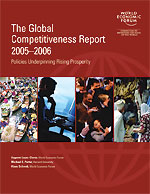Archive: October 2005
Good jobs, bad jobs
October 21, 2005
On Tuesday, the Center for Economic and Policy Research, where I work, released a report I've just written on "How Good is the [US] Economy at Creating Good Jobs". Defining a "good job" is obviously subjective, but using the definition in my report --the job pays at least $16 per hour (about $32,000 a year) and provides employer-paid health insurance and a pension-- about one-fourth of the US workforce had a good job in 2004. Defining a bad job as one that paid less than $16 per hour and had no health insurance and no pension, about the same share, one fourth, of workers were in bad jobs in the same year.
For me, the biggest finding was that the share of the US workforce in a good job in 2004 was almost exactly what it had been in 1979. This is remarkable because the US economy is about 60 percent richer per person now than it was at the end of the 1970s. The US economy has not been able to convert the substantial economic growth we've experienced over the last 25 years into any more good jobs. Given the magnitude of the economic growth, this is an appalling performance, another symptom of the incredible upward redistribution of income and wealth in the US economy that started at the end of the 1970s and continues today.
The Washington Post's "Think Tank Town" blog accused me of "torturing the data". I report, you decide.
October 5, 1940
October 5, 2005

Almost half of NoApparentMotive's regular readership turns 65 today. So, I want to wish a very happy birthday to my father, John Schmitt.
Podcasting
October 4, 2005
You can download a "podcast" of a talk that I gave last Thursday evening as part of the Center for Economic and Policy Research's "Economics You Can Use" series. The ten-part series seeks to teach basic economic "self-defense" to activists, advocates, organizers, policy-makers and others working on economic-justice issues.
My forty-five-minute talk focused on the rise in economic inequality in the United States since the end of the 1970s. The CEPR-seminar-series page also includes the slides from the talk, the paper that the talk was based on, and a downloadable recording of the discussion period afterwards.
Podcasting is a phenomenal technology. To date, the internet has allowed anyone with a computer and $20 a month for an internet connection and a web-hosting service to publish whatever they'd like to write. Podcasting means that now almost anyone can also run a bargain-basement radio station. The CEPR seminar series only scratches the surface of the potential here.
We're No. 2
October 2, 2005

Last week, the pro-business World Economic Forum (WEF) released its latest annual Global Competitiveness Report (GCR). The report ranks the competitiveness of 117 of the world's countries, according to "the perceptions and observations of business leaders in a given country."
The United States finished second. Northern Europe economies, which follow a distinctly unamerican economic model, also did extremely well. Finland finished first; Sweden, third; Denmark, fourth; Iceland, seventh; and Norway, ninth. (You can see the complete country rankings here.)
The WEF rankings, which year in and year out show many European economies to be highly competitive, deserve much more attention than they get. The top performing Northern European economies have much higher tax rates, almost completely unionized economies, national health insurance systems, paid parental leave, generous paid vacation and sick leave, and many other violations of the "Washington consensus" about how countries should organize their economies. Yet, these countries' economies consistently perform as well or better than the US economy, with a fraction of the social problems, including poverty, crime, incarceration, and teen pregnancies.
An important reason for the excellent performance in Northern European economies is their high taxes. The working economic model in the mind of most Republicans and a depressingly large share of Democrats holds that taxation involves taking money away from people and throwing it into the garbage. The successful economies of Northern Europe, however, take money from tax payers and use the funds to provide education, health care, child care, and other valuable social services, in quantities and quality unimaginable here in the United States. Business leaders recognize that these government services go a long way toward providing a healthy, well-educated, secure, and well-motivated labor force.
One of the great ideological victories of the right over the last thirty years or so has been the nullification of any critique of the United States that is based on the (positive) experience of another country. The unique nature of the United States apparently means that we can learn nothing from other countries. While I reject this framing of debates, I don't see any way around it in the near future. So, I'm not arguing that the Democrats or progressives should incorporate the latest Global Competitiveness Report results into their regular talking points. But, I am saying that people who think about politics and policy for a living, should, in the privacy of their own homes, feel confident that there is a better way. Even the world's business leaders agree.